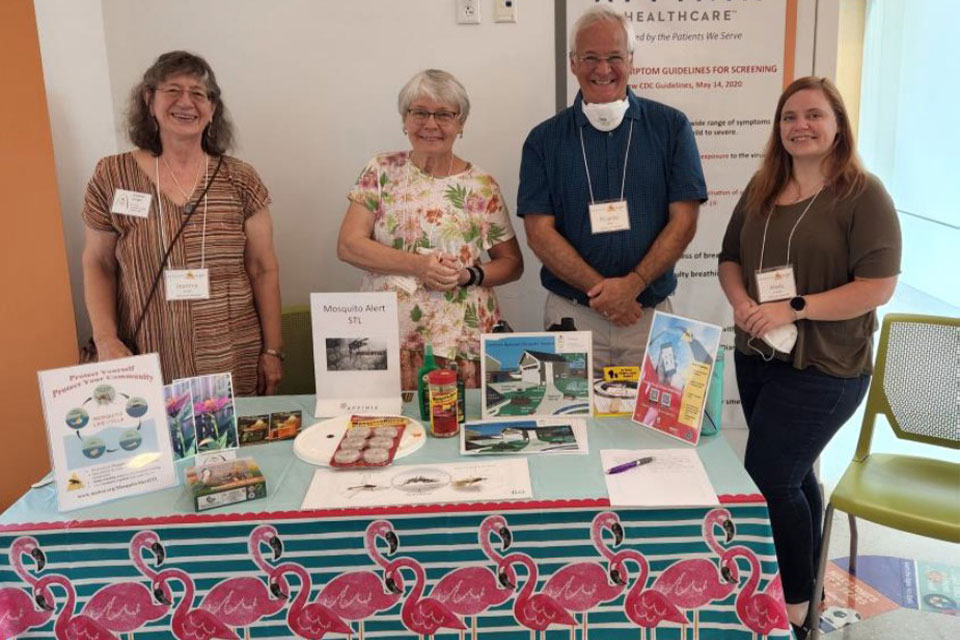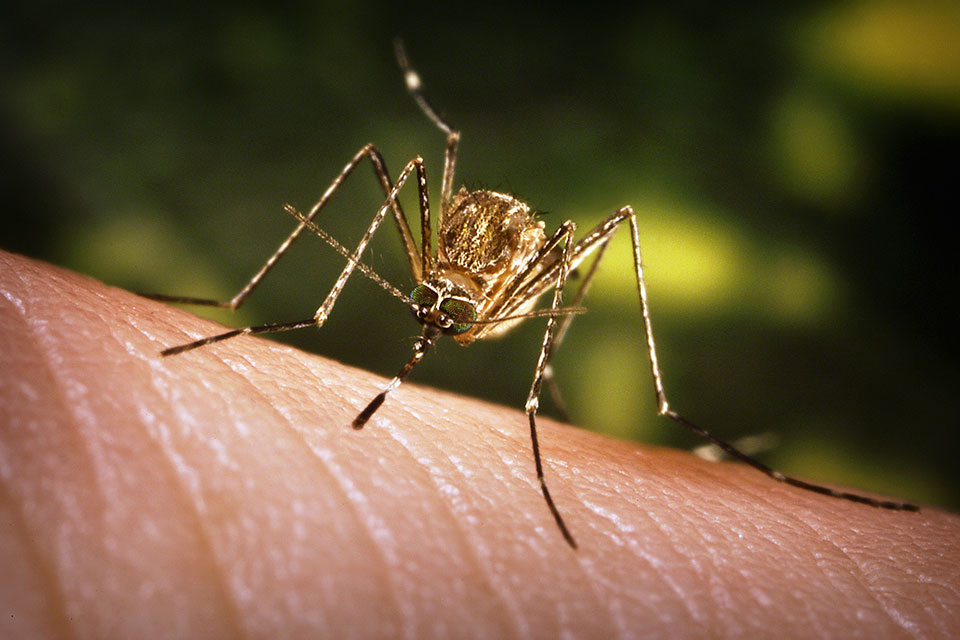SLU Calls on Citizen Scientists to Snap Mosquito Photos
This winter, the (mostly) cold St. Louis weather has been a welcome reprieve from bugs and other pests that inhabit the region during the other three seasons. But that may not be the case for very much longer.
Due to climate change, warmer temperatures throughout the year could mean a longer mosquito season. For the past year, researchers at Saint Louis University have been working on an app-based citizen science campaign that can help St. Louisans keep track of mosquito hotbeds, determine if any mosquitos have the potential to carry diseases, learn how to better protect themselves from these pests and more, all while engaging in community science.
Professor of behavioral science and health education Ricardo Wray, Ph.D., and director of public health practice Spring Schmidt, Ph.D., at Saint Louis University's College for Public Health and Social Justice, are two of the lead researchers on the project, called Mosquito Alert STL (MASTL), in collaboration with Jean Ponzi, Green Resources Manager at the EarthWays Center of the Missouri Botanical Garden, and Jeanine Arrighi, consultant to the St. Louis Academic Health Department, as well as public health graduate students. The partnership also includes Vector Control personnel from the City of St. Louis Department of Health, the St. Louis County Department of Public Health, and entomologists from the Tyson Research Center at Washington University of St. Louis.
Expanding on a project that was originally developed in Spain, Mosquito Alert allows community members to engage in citizen science by taking photos and tracking mosquitos in the area. Whenever you see a mosquito or get a bite, you can take a photo of it and upload it to the app. Within 24 hours, entomologists from St. Louis City or St. Louis County can tell you what kind of mosquito it is. This helps monitor mosquito activity throughout the St. Louis area.
“Climate change has fundamentally changed our typical mosquito season,” Schmidt said. “St. Louis, in particular, hovers in an area where having mosquitoes year-round is not an unrealistic fate anymore. From a public health standpoint, having mosquitoes year-round and having more tropical mosquito species starting to live in the region, there’s a greater chance of finding disease-carrying mosquitoes. So for us, it was incredibly important to work with Mosquito Alert to bring the app to the region and begin those mitigation efforts.”
The Mosquito Alert app was first developed during the height of the Zika virus outbreak, encouraging Spanish citizens to help keep track of mosquitos to identify the kinds that would spread the disease. In St. Louis, with climate change extending the life of mosquitoes and potentially bringing in new invasive species, tracking mosquitoes and learning their patterns have never been more important.
“Mosquito Alert is really designed to enable people who have downloaded the app, just regular folks, to report sightings of mosquitos that they encounter in their day-to-day life,” Wray said. “It’s designed to be low-effort, but with big impacts.”
When users upload photos of their mosquito sightings, entomologists from the City and County health departments and the Tyson Research Center, identify the species. They report the ID back to the user and add it to their vector control surveillance data. This collaboration promotes communal cooperation, because as more data points are collected from the app, the clearer the picture emerges for mosquito colonies and potential community spread.
“Mosquito Alert demystifies what science is and who can or cannot be a scientist; anyone and everyone can use the app and be a scientist,” Wray said. “Good science is collaborative and it requires a lot of different people, moving parts and multiple data streams to really be successful.”
“A lot of people like to feel connected to their community and their neighborhood,” Schmidt added. “Mosquito Alert allows them to connect with their neighbors and make an impact in their direct neighborhood. By using this app, you’re engaged in prevention, information and communication, not just with those living with you but also with your local health officials and other scientists.”

In order to promote this citizen science project, Wray, Schmidt and the rest of the Mosquito Alert STL team have participated in public education to promote the app and mosquito awareness, at the Saint Louis Zoo, the Missouri Botanical Garden and community events hosted by Affinia Health. Connecting with the community and teaching them about mosquitoes and pest control in general has been just as important as getting users to engage with the app. As the 2023 mosquito season approaches, sharing best practices is vital for maintaining a healthy society.
“The educational piece is a really important part of this project,” Wray said. “When we go to these community events, we really want to emphasize the educational components and community engagement. We share facts with adults and kids, such as the fact that only female mosquitoes bite, because it’s part of the reproductive process; not many people know that. Or that preventing mosquito breeding is a much better control method than fogging. Everybody knows about mosquitoes, but these events provide an opportunity to engage with members of the community about all these different topics, and to raise awareness about mosquitoes and their role as pollinators in the broader ecological context.”
Wray and Schmidt are now focused on the 2023 mosquito season. Getting people on the app and regularly using it is key. Mosquito Alert STL will continue to promote the app through public education at local events as well as online and via social media. And as it grows, they hope to expand it further than just the bi-state region.
“2022 was our pilot year, 2023 is our action year,” Wray said. “We’re poised to do more outreach in St. Louis and bring people onto the app. Mosquitos aren’t going to wait for us, and so we’re ready to connect with the bi-state region and really get involved with our communities.”
The Mosquito Alert STL app can be found in both the Apple Store and Google Play.


















